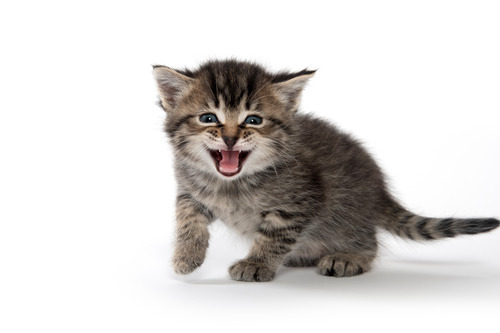My Cat Cries A Lot: Is This Normal?

When your cat cries a lot, it can tug at your heartstrings and leave you wondering if something is wrong. Cats, known for their independence, communicate with us in various ways, and excessive crying might be their way of sending a message. While some vocalization is normal, consistent or unusual crying can signal a range of possibilities, from behavioral issues to underlying health concerns. If your feline friend’s cries are frequent or seem out of the ordinary, the team at Partners Animal Hospital West Loop is happy to help determine the cause and help you better understand this behavior in cats. Call us at (312) 767-4762 or book an appointment online to get your cat the care they need.
Why Do Cats Cry A Lot?
Cats cry for various reasons, and understanding their behavior starts with recognizing why they might be vocalizing more than usual. Here are some of the most common causes of excessive crying in cats:
Hunger or Thirst
Cats are excellent communicators, and a loud or persistent meow is often their way of telling you they’re hungry or thirsty. If you notice your cat crying near their food or water bowl, it could mean their needs aren’t being met. Ensure they always have fresh water and consistent feeding schedules to minimize their cries.
Seeking Attention
If your cat cries a lot, they may simply want your attention. Cats are social creatures, and some breeds are more vocal than others, such as Siamese cats. They may cry to initiate playtime, express affection, or even convey loneliness. Spending quality time with your cat can help reduce attention-seeking cries.
Stress or Anxiety
Changes in your household—such as moving, introducing a new pet, or altering your cat’s routine—can lead to stress-induced crying. Cats are sensitive to environmental changes and may cry to express their discomfort or confusion. Offering a safe, quiet space for your cat can help ease their stress.
Mating Behaviors
Unspayed or unneutered cats often cry as part of mating behavior. Female cats in heat may become excessively vocal to attract a mate, while unneutered males may cry when they sense a female in heat nearby. Spaying or neutering your cat can help minimize these behaviors.
Illness or Pain
Excessive crying can sometimes indicate that your cat is in pain or unwell. If their cries are accompanied by other symptoms, such as changes in appetite, lethargy, or difficulty using the litter box, it’s time to seek veterinary attention. If you’re unsure why your cat cries a lot, our team at Partners Animal Hospital West Loop can assess their health and provide guidance tailored to your pet.
Is It Normal for Cats to Cry at Night?
Many pet owners notice their cats crying more frequently at night, which can be both puzzling and frustrating. Understanding why cats vocalize at night can help you address the issue.
- Natural Nocturnal Behavior: Cats are crepuscular animals, meaning they are naturally more active during dawn and dusk. At night, they might cry out of boredom or because they’re feeling playful. Providing your cat with toys or interactive playtime before bed can help tire them out and reduce nighttime cries.
- Age-Related Changes: Senior cats often cry more at night due to conditions like cognitive dysfunction syndrome (similar to dementia in humans). They may feel disoriented or anxious in the dark. If your older cat cries a lot at night, consult your veterinarian to rule out health issues and explore calming solutions.
- Attention-Seeking Behavior: If your cat is accustomed to getting attention when they cry at night, they may continue the behavior. Ignoring their cries while ensuring their needs are met during the day can help break this habit over time.
Nighttime crying can be challenging, but with patience and the right adjustments, you can help your cat feel more comfortable during these hours.
What to Do if Your Cat Cries a Lot
If your cat cries a lot, addressing their needs and identifying any potential issues can help resolve the behavior. Here are practical steps you can take to support your cat:
- Start by ensuring your cat has access to fresh food, water, and a clean litter box. Cats are creatures of habit, and maintaining consistency in their environment can prevent unnecessary vocalization.
- Regular play sessions and affection can make your cat feel more secure and less likely to cry for attention. Cats thrive on routine, so setting aside time each day for interaction can make a big difference.
- Enrichment activities, such as puzzle feeders and scratching posts, can keep your cat engaged and prevent boredom-related crying. Interactive toys can also help redirect their energy in a positive way.
- Pay attention to patterns in your cat’s crying. Are they vocalizing at specific times or in certain situations? Understanding their triggers can help you find solutions more effectively.
- If your cat’s crying is sudden, excessive, or paired with concerning symptoms, don’t wait to seek professional advice. Your veterinarian can rule out medical issues and provide tailored recommendations for your cat’s needs.
Partners Animal Hospital West Loop is here to assist you with any concerns about your cat’s vocalization. Contact us at (312) 767-4762 or book an appointment online today.
Seeking Veterinary Care for a Crying Cat
Excessive crying can sometimes be a sign of an underlying health issue that requires veterinary attention. Contact your veterinarian if your cat exhibits any of the following:
- Persistent crying that doesn’t resolve with basic care.
- Signs of pain, such as limping, hunching, or avoiding touch.
- Behavioral changes, including withdrawal or aggression.
- Crying accompanied by vomiting, diarrhea, or loss of appetite.
- Difficulty urinating or defecating.
At Partners Animal Hospital West Loop, our experienced team can perform a thorough examination to determine if your cat’s cries are due to a medical condition. Early intervention can make a significant difference in your cat’s well-being.
Building a Peaceful Environment for Your Cat
Creating a comfortable and secure environment is one of the best ways to minimize excessive crying. Provide your cat with a quiet area where they can retreat when they feel overwhelmed. This space should include their bed, toys, and a scratching post. Cats thrive on routine, so maintaining consistent feeding, play, and rest schedules can help them feel secure. Pheromone diffusers or sprays can help reduce anxiety in cats, especially during stressful situations like moving or introducing new pets. Regular wellness visits with your veterinarian can ensure your cat stays healthy and prevent medical issues that might lead to excessive crying.
If your cat cries a lot, addressing their emotional and physical needs is key to their happiness. Our compassionate team at Partners Animal Hospital West Loop can help restore peace in your household. Call us at (312) 767-4762 or book an appointment online to give your cat the care they deserve.
About Us
At Partners Veterinary Group, we believe in energizing our team members through shared values, while helping them create value for our clients and patients. Knowing we can help make pets’ and people’s lives better motivates us to continually strive for excellence and love what we do.
Our team consistently works to build educational, supportive, and cooperative work environments that cater to positive experiences and professional growth. We’re constantly evolving, creating innovative ways to deliver cutting-edge medicine to our patients. We equip our teams with tools to enhance their skills and improve their knowledge.
